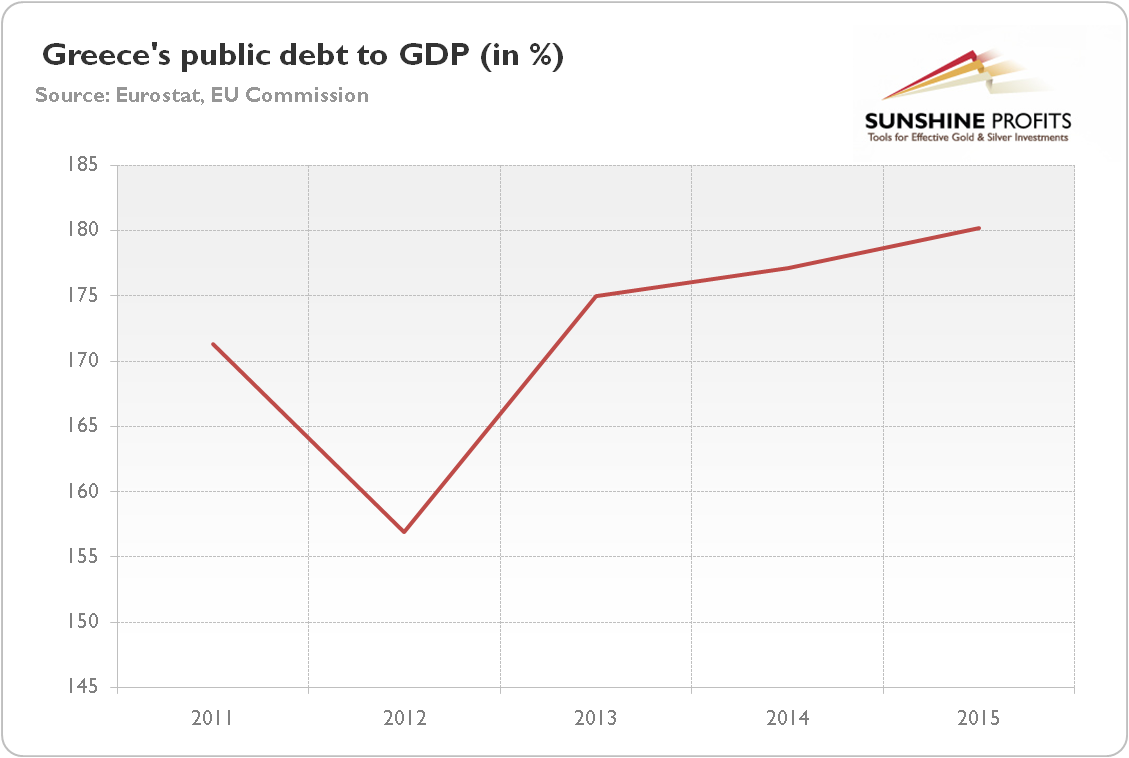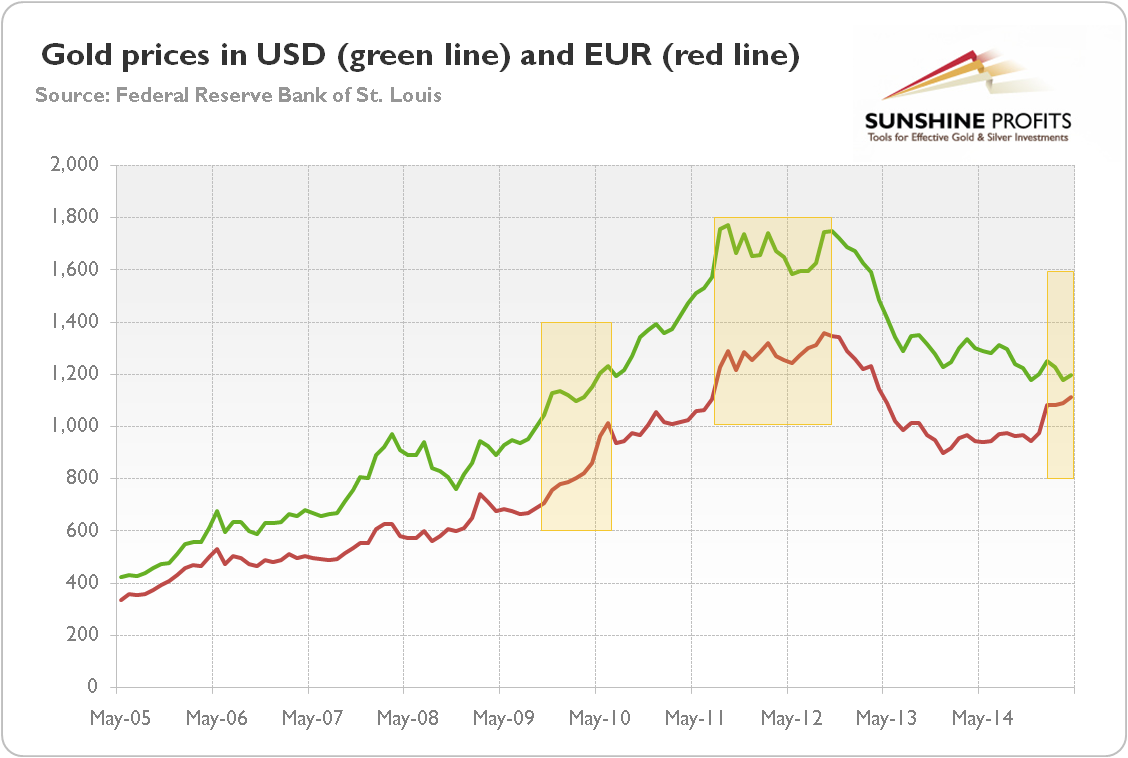The last part of the Greek tragedy began when Syriza won the general election in January 2015. This radical-left party wanted to challenge the logic of the bailout deal and opposed an extension of the bailout program that ended February 28. Eventually, the bailout program for Greece was extended – in return for Greece’s commitment to honor its debt obligations and conduct structural reforms –within four months (the end of June), just weeks before Greece’s due date to make several large debt repayments.
What are the current economic difficulties of Greece? The main problem is quite simple: Greece does not have enough income to pay its bills. Hellas has to pay off over €1.5 billion to the IMF in June and €7 billion to the ECB to repay government bonds (including interest), which mature in July and August. It does not mean that the country will immediately default without unblocking the last €7.2 billion tranche of the current bailout program. Greece managed to improve its budget in the first quarter of 2015. However, according to Silvia Merler, the improvement was achieved mainly by “postponing payments to suppliers (e.g., to the hospitals – note ours) which can be efficient in improving the budget in the short term, but the postponement of state payments to suppliers may hurt the real economy even further”. Indeed, Greece’s economy fell into recession again in the first quarter as its GDP contracted by 0.2 percent, after shrinking 0.4 percent in the previous period. Moreover, to make the last payment to the IMF, Greece had to use its special drawing rights (held at the IMF) and to borrow money from different parts of the state administration, public enterprises and pension funds. Thus, it seems likely that the government will struggle to make payments twice as large. Economists believe that Hellas will probably survive until July 20, when it has to make the €3.5 billion payment to the ECB. According to Peter Spiegel, Greece needs a third bailout of as much as €37.8 billion.
The public finances are not the only problem. The Greek banks are facing bad loans, deposit outflows and are running out of the collateral they need to survive. And the Hellas’ bad financial situation is aggravated by the debt servicing costs. Greece’s debt is the highest in the Eurozone and it will reach 180.2 percent of the GDP this year (see the chart 1).
Chart 1: Greece’s general government gross debt to GDP (in %) between 2011 and 2015

However, contrary to popular opinion, the debt-servicing burden is not excessive, compared to other countries and historical cases. This is because creditors lowered interest rates and extended loan maturities (the average maturity of Greece’s debt is now 16.5 years, double that of Germany and Italy). Interest payments fell from 7.3 percent of GDP in 2011 to 4.3 percent of GDP in 2014 (and subtracting interest payments refunded and deferred, Greece already has to pay only 2.6 percent), similar to 4.4 percent in the case of Ireland in 2013, 4.8 percent in the case of Italy and 5 percent in case of Portugal. Therefore, Greece pays less than the countries with much lower debt-to GDP ratios; however the payments falling due this year are the real issue.
The truth is that the Greek government is simply not willing to repay the debt in full, especially with an economy that is falling into recession. It could do it, for example, by selling its assets, by deregulating and liberalizing its economy to revive totally uncompetitive exports(Greece is the least competitive economy in the Eurozone), or by reforming its pension system, which costs 17.5 percent of the GDP, while the average pension expenditures in the Eurozone amount to the 13.8 percent of the GDP. However, it won’t, just because it believes that Greece has been a victim of excessive austerity.To sum up, the Greek government will struggle to make payments which fall due in July and August. It seems unlikely that Hellas will manage to repay its summer debt obligations without the agreement of its creditors or a significant drag on its real economy (in the form of default on obligations against its suppliers and employees). However, even a new rescue package will not help, because Greece – as the last Soviet-style economy in Europe – is a bottle without a bottom. Therefore, a sustainable solution is not possible without substantial reforms in Greece.
Thus, it seems that in the nearest future Greece’s debt crisis will be a supportive factor for gold prices. Fears over Greece should increase in the coming days, so then the gold prices, as the yellow metal will be bought as a safe haven or a hedge against the financial turmoil that could follow a Greek default. This was the case in 2010, when the Greek crisis led to safe-haven buying and supported gold prices, and also in 2012, when the gold price peaked around the time that Grexit fears were at their highest (see the chart no. 2). On the other hand, if fears diminish– for example, because the new bailout package will eventually be finalized–gold prices will probably decrease.
Chart 2: Gold prices in USD (green line) and EUR (red line) between May 2005 and April 2015 with selected periods of highest Grexit fears.

Information on these pages contains forward-looking statements that involve risks and uncertainties. Markets and instruments profiled on this page are for informational purposes only and should not in any way come across as a recommendation to buy or sell in these assets. You should do your own thorough research before making any investment decisions. FXStreet does not in any way guarantee that this information is free from mistakes, errors, or material misstatements. It also does not guarantee that this information is of a timely nature. Investing in Open Markets involves a great deal of risk, including the loss of all or a portion of your investment, as well as emotional distress. All risks, losses and costs associated with investing, including total loss of principal, are your responsibility. The views and opinions expressed in this article are those of the authors and do not necessarily reflect the official policy or position of FXStreet nor its advertisers. The author will not be held responsible for information that is found at the end of links posted on this page.
If not otherwise explicitly mentioned in the body of the article, at the time of writing, the author has no position in any stock mentioned in this article and no business relationship with any company mentioned. The author has not received compensation for writing this article, other than from FXStreet.
FXStreet and the author do not provide personalized recommendations. The author makes no representations as to the accuracy, completeness, or suitability of this information. FXStreet and the author will not be liable for any errors, omissions or any losses, injuries or damages arising from this information and its display or use. Errors and omissions excepted.
The author and FXStreet are not registered investment advisors and nothing in this article is intended to be investment advice.
Recommended Content
Editors’ Picks

EUR/USD consolidates weekly gains above 1.1150
EUR/USD moves up and down in a narrow channel slightly above 1.1150 on Friday. In the absence of high-tier macroeconomic data releases, comments from central bank officials and the risk mood could drive the pair's action heading into the weekend.

GBP/USD stabilizes near 1.3300, looks to post strong weekly gains
GBP/USD trades modestly higher on the day near 1.3300, supported by the upbeat UK Retail Sales data for August. The pair remains on track to end the week, which featured Fed and BoE policy decisions, with strong gains.

Gold extends rally to new record-high above $2,610
Gold (XAU/USD) preserves its bullish momentum and trades at a new all-time high above $2,610 on Friday. Heightened expectations that global central banks will follow the Fed in easing policy and slashing rates lift XAU/USD.

Week ahead – SNB to cut again, RBA to stand pat, PCE inflation also on tap
SNB is expected to ease for third time; might cut by 50bps. RBA to hold rates but could turn less hawkish as CPI falls. After inaugural Fed cut, attention turns to PCE inflation.

Bank of Japan set to keep rates on hold after July’s hike shocked markets
The Bank of Japan is expected to keep its short-term interest rate target between 0.15% and 0.25% on Friday, following the conclusion of its two-day monetary policy review. The decision is set to be announced during the early Asian session.

Moneta Markets review 2024: All you need to know
VERIFIED In this review, the FXStreet team provides an independent and thorough analysis based on direct testing and real experiences with Moneta Markets – an excellent broker for novice to intermediate forex traders who want to broaden their knowledge base.